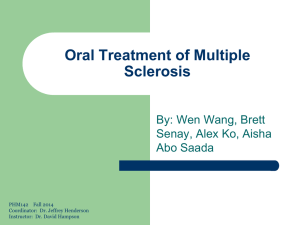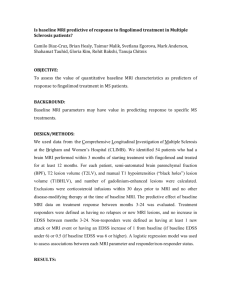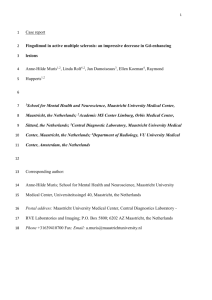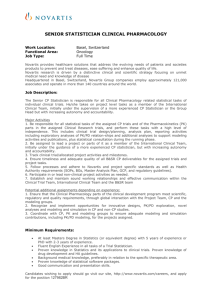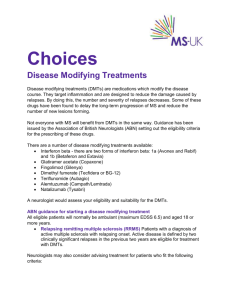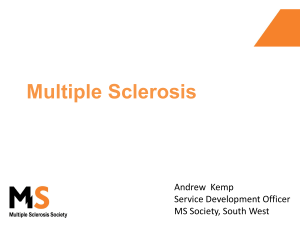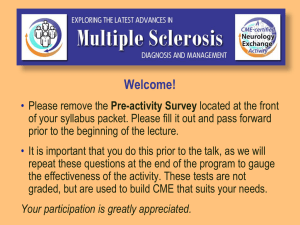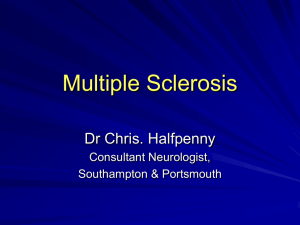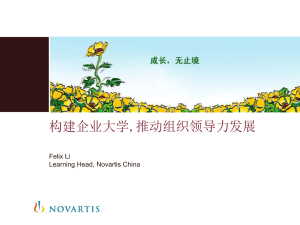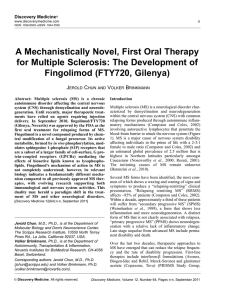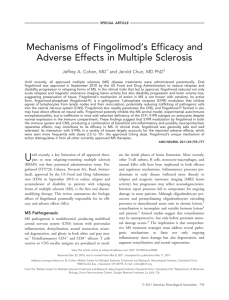Global Press Release Template Color logo
advertisement
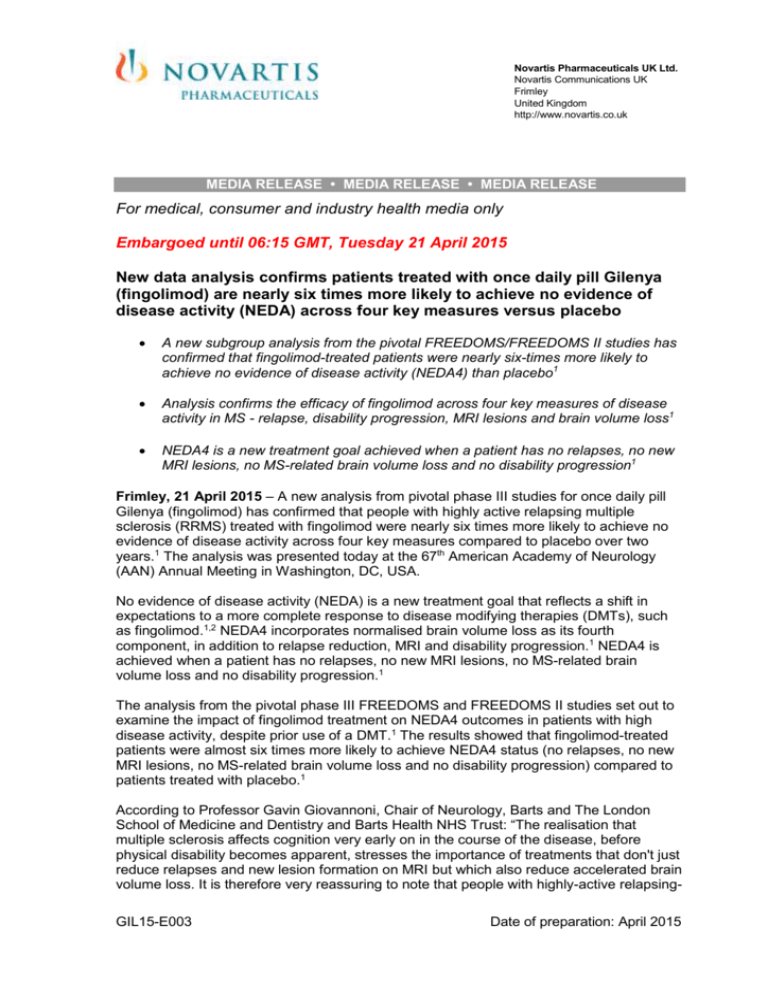
Novartis Pharmaceuticals UK Ltd. Novartis Communications UK Frimley United Kingdom http://www.novartis.co.uk MEDIA RELEASE • MEDIA RELEASE • MEDIA RELEASE For medical, consumer and industry health media only Embargoed until 06:15 GMT, Tuesday 21 April 2015 New data analysis confirms patients treated with once daily pill Gilenya (fingolimod) are nearly six times more likely to achieve no evidence of disease activity (NEDA) across four key measures versus placebo A new subgroup analysis from the pivotal FREEDOMS/FREEDOMS II studies has confirmed that fingolimod-treated patients were nearly six-times more likely to achieve no evidence of disease activity (NEDA4) than placebo1 Analysis confirms the efficacy of fingolimod across four key measures of disease activity in MS - relapse, disability progression, MRI lesions and brain volume loss1 NEDA4 is a new treatment goal achieved when a patient has no relapses, no new MRI lesions, no MS-related brain volume loss and no disability progression1 Frimley, 21 April 2015 – A new analysis from pivotal phase III studies for once daily pill Gilenya (fingolimod) has confirmed that people with highly active relapsing multiple sclerosis (RRMS) treated with fingolimod were nearly six times more likely to achieve no evidence of disease activity across four key measures compared to placebo over two years.1 The analysis was presented today at the 67th American Academy of Neurology (AAN) Annual Meeting in Washington, DC, USA. No evidence of disease activity (NEDA) is a new treatment goal that reflects a shift in expectations to a more complete response to disease modifying therapies (DMTs), such as fingolimod.1,2 NEDA4 incorporates normalised brain volume loss as its fourth component, in addition to relapse reduction, MRI and disability progression.1 NEDA4 is achieved when a patient has no relapses, no new MRI lesions, no MS-related brain volume loss and no disability progression.1 The analysis from the pivotal phase III FREEDOMS and FREEDOMS II studies set out to examine the impact of fingolimod treatment on NEDA4 outcomes in patients with high disease activity, despite prior use of a DMT.1 The results showed that fingolimod-treated patients were almost six times more likely to achieve NEDA4 status (no relapses, no new MRI lesions, no MS-related brain volume loss and no disability progression) compared to patients treated with placebo.1 According to Professor Gavin Giovannoni, Chair of Neurology, Barts and The London School of Medicine and Dentistry and Barts Health NHS Trust: “The realisation that multiple sclerosis affects cognition very early on in the course of the disease, before physical disability becomes apparent, stresses the importance of treatments that don't just reduce relapses and new lesion formation on MRI but which also reduce accelerated brain volume loss. It is therefore very reassuring to note that people with highly-active relapsingGIL15-E003 Date of preparation: April 2015 remitting MS are nearly six times more likely to achieve NEDA4 on fingolimod compared to placebo. NEDA4 is new treatment target of no evident disease activity that incorporates ‘normalised’ brain volume loss as its fourth component, in addition to relapse reduction, MRI and disability progression." The results from this new analysis confirmed:1 20.5% of patients treated with fingolimod (n=218) achieved NEDA4 status compared to 3.9% in the placebo group (n=229) Comparing between the two treatment arms, the odds ratio for achieving NEDA4 status was 6.35 (95%CI 3.02, 13.35) favouring fingolimod (p<0.0001) The concept of NEDA is well established in other conditions such as rheumatoid arthritis, where the aim is to treat people as soon as possible after diagnosis to prevent a build-up of symptoms, rapidly switching to more effective drugs when there is no response to first line treatments.2 The new analysis presented at AAN follows a series of recent decisions by the European Commission, Scottish Medicines Consortium (SMC) and NHS England to extend the use of fingolimod to a wider group of people since its original licence in 2011.3,4,5 To date, more than 100,000 people worldwide have been treated with fingolimod in clinical trials and in the post-marketing setting. Fingolimod has been approved in 80 countries.6 -ENDS- Notes to editors MS is the most common neurological condition affecting young adults in the UK It is estimated that 100,000 people in the UK have MS - relapsing remitting MS (RRMS) is the most common form, affecting 85% of people7,8 On 9 June 2014, the European Commission recommended the expanded use of fingolimod for adult patients with highly active relapsing remitting multiple sclerosis3 o The indication expansion gave clinicians the flexibility to use fingolimod in patients needing to switch from interferons as well as glatiramer acetate and other disease modifying treatments (DMTs) o Prior to the indication expansion, fingolimod was limited for use in those patients with highly active RRMS not responding to an interferon On 18 June 2014, NHS England published new guidance to allow a switch to fingolimod for those patients with highly active RRMS who meet the following criteria:4 o Patients who have an unchanged or increased relapse rate or ongoing severe relapses compared with the previous year despite treatment with beta interferon or glatiramer acetate o As an alternative to monthly infusion natalizumab for those patients receiving natalizumab who are at high risk of developing progressive multifocal leukoencephalopathy (PML) as defined by the following: - JCV exposure indicated by anti-JCV antibody positive status - Receiving an immunosuppressant prior to receiving natalizumab - Natalizumab treatment duration of >2 years On 13 October 2014, the Scottish Medicines Consortium (SMC) recommended expanded use of fingolimod for people with a severe form of relapsing remitting multiple sclerosis - known as rapidly evolving severe relapsing remitting MS (RES RRMS). This was the first time an oral treatment was made available as a first line treatment option for people with this severe form of MS9 GIL15-E003 Date of preparation: April 2015 On 14 April 2015, the Scottish Medicines Consortium (SMC) recommended the expanded use of fingolimod to people with high disease activity despite treatment with at least one disease modifying therapy.5 About Novartis Novartis provides innovative healthcare solutions that address the evolving needs of patients and societies. Headquartered in Basel, Switzerland, Novartis offers a diversified portfolio to best meet these needs: innovative medicines, eye care, cost-saving generic pharmaceuticals, preventive vaccines, over-the-counter and animal health products. Novartis is the only global company with leading positions in these areas. In 2013, the Group achieved net sales of USD 57.9 billion, while R&D throughout the Group amounted to approximately USD 9.9 billion (USD 9.6 billion excluding impairment and amortization charges). Novartis Group companies employ approximately 135,000 full-time-equivalent associates and sell products in more than 150 countries around the world. For more information, please visit http://www.novartis.com. References 1. De Stefano N et al. Impact of fingolimod on achieving no evidence of disease activity and worsening (NEDA)-4 in previously treated patients with high disease activity. Poster presented at: 67th AAN Annual Meeting; April 18 – 25, 2015; Washington, DC. Poster Session III, P3.246. 2. No evidence of disease activity (NEDA) - new treatment goal. Last accessed April 2015. http://www.mstrust.org.uk/news/article.jsp?id=5893. 3. European Commission. Community register of medicinal products for human use. Gilenya. http://ec.europa.eu/health/documents/community-register/html/h677.html Last accessed 10 October 2014. 4. NHS England commissioning guideline for Gilenya. June 2014 5. Fingolimod guidance https://www.scottishmedicines.org.uk/SMC_Advice/Advice/1038_15_fingolimod_Gilenya/fingoli mod_Gilenya 6. Gilenya World Watch. http://www.gilenya-world-watch.com/English.html Last accessed 10 October 2014 7. MS Society website. http://www.mssociety.org.uk/what-is-ms/information-about-ms/about-ms. Last accessed April 2014 8. MS Society website http://www.mssociety.org.uk/what-is-ms/types-of-ms/relapsing-remittingrrms Last accessed April 2015 9. SMC assessment of fingolimod (as hydrochloride), 0.5mg hard capsules (Gilenya®). October 2014. Novartis Media Relations Media contacts Tessa Lush Novartis Pharmaceuticals UK Ltd. Tel: +44 1276 698 691 (Press Office) Email: press.office@novartis.com GIL15-E003 Siân Hurst Aurora Healthcare Communications Tel: +44 7949 733 493 Email: FTYteam@auroracomms.com Date of preparation: April 2015
